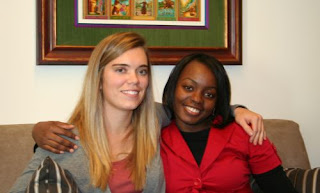Student Feature: Karl Kroger
 Reflections from Karl Kroger, Third Year MDiv student from North Dakota. Reflections from Karl Kroger, Third Year MDiv student from North Dakota.As a Candler student one of my hopes has been that we would seek social justice together as a community. What would it look like for Candler to live out Micah 6:8, not just in our individual ministries, but as a community? What kind of impact could we have in Atlanta if we collectively worked on issues like sex trafficking, homelessness, or the death penalty? During the past two months I have had the pleasure of being able to see my hope and dream become a reality. The Candler community has been actively working to stop the execution of Troy Davis. Troy Davis was convicted of killing a police officer, however he has a strong case of innocence. Despite poor evidence and the recanted testimonies of the majority of witnesses, as well as opposition from pro-death penalty advocates, the state of Georgia has attempted to execute Troy Davis three times.  Each time, growing numbers of the Candler community have been fighting to save Troy’s life. Staff and faculty have signed letters to the governor. Students have organized vigils, attended rallies, and marched in the streets. Students have also collected petitions, hung banners, and strategized other non-violent tactics. Working together with lawyers, faith leaders, college students, other seminaries, Amnesty International, and Georgians for Alternatives to the Death Penalty, Candler students have been actively seeking justice. Each time, growing numbers of the Candler community have been fighting to save Troy’s life. Staff and faculty have signed letters to the governor. Students have organized vigils, attended rallies, and marched in the streets. Students have also collected petitions, hung banners, and strategized other non-violent tactics. Working together with lawyers, faith leaders, college students, other seminaries, Amnesty International, and Georgians for Alternatives to the Death Penalty, Candler students have been actively seeking justice. As I write, Troy’s fate on death row remains uncertain. Because of Troy’s faith in God, his ultimate destiny is known. Shortly before his execution in September, Troy wrote, “I can't wait to stand with you, no matter if that is in physical or spiritual form. I will one day be announcing, ‘I AM TROY DAVIS, and I AM FREE!’” I give thanks to God for Troy’s life and the inspiration he has been to the Candler community. Troy has helped us be more faithful to God. As I write, Troy’s fate on death row remains uncertain. Because of Troy’s faith in God, his ultimate destiny is known. Shortly before his execution in September, Troy wrote, “I can't wait to stand with you, no matter if that is in physical or spiritual form. I will one day be announcing, ‘I AM TROY DAVIS, and I AM FREE!’” I give thanks to God for Troy’s life and the inspiration he has been to the Candler community. Troy has helped us be more faithful to God.For more information about Troy and the status of his case visit www.gfadp.org. Karl Kroger (pictured top) is a third year MDiv student at Candler School of Theology. He is currently the chair of the Social Concerns Network and is a member of the Candler Singers,one of Candler's choirs. His blog, krogermix.com, features social justice news, video resources, and advocacy opportunities. Karl was recently selected as the Student Leader of the Month by Emory's Office of Student Leadership and Service. Labels: Candler Social Concerns Network, Karl Kroger, Micah 6:8, Social Justice posted by Candler Admissions at 1:48 PM 0 comments |







